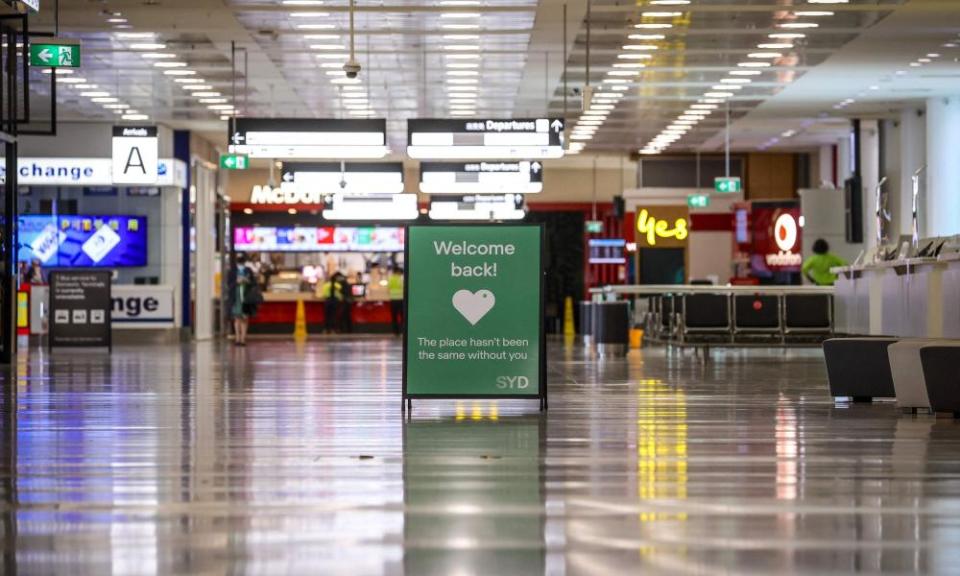Airlines cast doubt on flying unvaccinated passengers to Australia

Most international airlines who fly into Australia are likely to accept only vaccinated passengers, with larger carriers now considering whether it is logistically and commercially viable to sell tickets to unvaccinated travellers. Some carriers have had their allocation of unvaccinated passengers capped at zero.
From Monday, when New South Wales and Victoria reopen for international travel and quarantine-free arrival for fully vaccinated Australians, the states will drastically scale back their hotel quarantine capacities for unvaccinated passengers.
NSW will accept 210 unvaccinated passengers a week, and Victoria 250.
Airlines have announced tens of thousands of extra seats on new services into Australia since the states announced an end to quarantine, but many carriers are yet to decide how or if they will comply with the new rules for unvaccinated passengers.
It is understood that the new unvaccinated passenger caps will be managed in a similar way to the broader passenger cap system that has been in place since July 2020, in which states set their own hotel quarantine limits, and the commonwealth – which is responsible for international border management – communicates passenger allowances to individual airlines for each service.
Some airlines have been given unvaccinated passenger caps of zero.
Other airlines have been given such small caps – such as four unvaccinated passengers per flight – that they are considering refusing the allowance and offering it to be distributed to other airlines.
Some larger airlines are understood to be waiting to see how many unvaccinated cap spots are returned by other carriers so they can calculate if it is financially viable to consolidate their allowance into a weekly service just for unvaccinated passengers.
Airlines are understood to be unclear how the unvaccinated caps will work and their duties in verifying passengers’ status, as their booking systems are not set up to offer individual seats for unvaccinated travellers.
Related: Covid-19 vaccine booster shots: where and when you can get your third dose in Australia
There are also concerns that Australians who have been stranded overseas without access to TGA-recognised vaccines made bookings in the months before the new rules were announced, meaning some flights may have exceeded their unvaccinated caps.
Additionally, other countries have different requirements on the vaccination of children aged 12 and above. While Australia requires two doses, the UK allows for only one in the vast majority of cases, and airlines are concerned this could force an entire family into quarantine and breach their allowance. Children under 12 will not be considered unvaccinated.
Before NSW and Victoria announced an end to quarantine for fully vaccinated passengers, Qantas had announced it would accept only fully immunised travellers on its international services when it resumed flying.
Emirates’ website also states that “to travel to Sydney on Emirates, you must qualify for the quarantine‑free arrival channel in Sydney”. The airline declined to comment on the possibility of carrying unvaccinated passengers.
The Singapore Airlines website states that all its services to Sydney and Melbourne are designated “for eligible passengers only”, detailed as those who have been fully vaccinated with a TGA-approved vaccine.
Etihad’s website warns unvaccinated customers seeking to travel to Sydney or Melbourne to make their booking via an email address. “If they are not vaccinated with full dose(s) of an approved vaccine they need to email us to book their flight, as there is a limited number of seats per flight for unvaccinated guests,” a spokesman for the airline said.
Cathay Pacific’s website also directs unvaccinated passengers to book by phone or email.
The Qatar Airways policy is less clear – its website states that when booking a flight to Sydney “you must be vaccinated from the approved and recognized Covid-19 vaccinations by the TGA”, but in response to a direct question about flying unvaccinated passengers, the company said it “has been carrying passengers regardless of their vaccination status, throughout the Covid-19 pandemic”.
“We will continue to comply with governmental policy in the countries we operate in, and it is the responsibility of each passenger to ensure they have the necessary documentation for their journey,” the company said.
Related: Qantas in talks with federal government over vaccine rules for Australian children stuck overseas
Barry Abrams, the executive director of the Board of Airline Representatives of Australia, said airlines were considering either returning their allowances or trying to pool their allowances from all their services into one weekly flight, because airlines were not equipped to sell unvaccinated tickets on their booking systems.
He said most airlines “have a stock of existing bookings to which they don’t know passengers’ vaccinations status or if they’re exceeding capacity already”.
“No carrier will get a total allocation for unvaccinated passengers across a week that would add up to be sufficient to support a commercially viable flight for just that unvaccinated cohort ... They’re waiting to see what other airlines do, to see if they can roll their allocations across a week into one service.
“It may not be worth it for some, and they may consider handing back their allowance to go back into the pool of spots for other airlines,” Abrams said.
Abrams said airlines were also unclear on how they would enforce the rule that citizens, permanent residents and their families were to be prioritised in the initial reopening, noting that airlines don’t collect proof of nationality or relationship at booking.

 Yahoo Movies
Yahoo Movies 